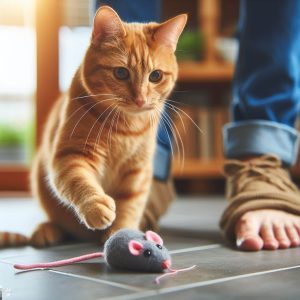If your cat has been throwing up yellow or greenish liquid multiple times over several days, you may be wondering why this is happening and how to help them feel better. Bilious vomiting in cats, where they bring up bile from the small intestine or gallbladder, can indicate a few different underlying causes.
While an occasional episode of bile vomit is normal, frequent bile vomiting for more than 24 hours may signal a more serious health issue requiring veterinary care. This comprehensive guide will explore the common reasons for chronic bilious vomiting in cats, tips for soothing an upset stomach at home, and when to seek help from your vet.
What is Bilious Vomiting?
Bile vomit, also known as bilious vomiting syndrome, is characterized by yellow or green-colored liquid that a cat’s body expels from the mouth.
This bile fluid comes from the feline’s gallbladder or small intestines. The bile contains digestive enzymes that help break down fats within food.
Small amounts of bile may enter the stomach and get vomited up occasionally in healthy cats. However, bilious vomiting becomes a concern when it occurs repeatedly and prevents your cat from holding down food.
Some key signs of bilious vomiting in cats include:
- Liquid vomit that is yellow, gold, or greenish in color. The bile pigments lend an orange, yellow, or green hue.
- Occurs when the stomach is empty, such as early mornings or several hours after eating.
- Frequency of more than 2-3 episodes per week. Chronic vomiting persisting over days is not normal.
- Undigested food not present in the vomit, only liquid bile.
- Your cat appears nauseated before vomiting episodes. They may lick their lips, swallow excessively, or hide.
- Loss of appetite or unwillingness to eat.
- Dehydration from excessive vomiting may occur. Signs include lethargy, dry gums, weakness, and lack of skin elasticity.
If your cat shows any signs of distress, lethargy, or dehydration along with persistent bile vomiting, seek veterinary help immediately. Now let’s explore some potential causes.
Common Causes of Bilious Vomiting
There are many possible medical explanations for why a cat would vomit bile frequently or for multiple days in a row. Here are some of the most common causes:
Gastrointestinal Upset
Cats can vomit bile due to general irritation or inflammation within the gastrointestinal (GI) tract:
- Empty stomach – Bilious vomiting often occurs when a cat’s stomach has been empty for too long, allowing the accumulation of stomach bile. Their stomach bile irritates the lining, causing vomiting.
- Food sensitivities – Allergies or intolerances to ingredients in cat food or treats can cause GI irritation. Common food allergens for cats include beef, dairy, and fish.
- Abrupt diet change – An abrupt switch between different cat foods can upset your cat’s digestion and lead to vomiting.
- Eating grass – Cats sometimes nibble on grass to induce vomiting of hairballs or to calm an upset stomach. But grass can irritate the GI tract and cause vomiting bile.
- Medications – Antibiotics, pain meds like NSAIDs, chemotherapeutics, and some supplements can cause nausea or vomiting as side effects.
Infections and Viruses
Infections of the stomach and intestinal tract may cause irritation, inflammation, and bile vomit:
- Bacterial infections – Salmonella, Clostridium perfringens, and E. coli bacteria can sometimes contaminate cat food and cause gastrointestinal infections.
- Viral infections – Feline panleukopenia virus, calicivirus, herpesvirus, and other viruses can infect the stomach and intestinal lining.
- Parasites – Intestinal parasites like roundworms, hookworms, giardia, or tritrichomonas can irritate the GI tract and induce vomiting.
- Fungal infections – Ringworm fungus in the gut is one possibility. Anti-fungal medications often cause nausea too.
Digestive Tract Problems
Structural or functional issues affecting the stomach, intestines, or related organs might lead to bile vomiting:
- Inflammatory bowel disease (IBD) – Chronic inflammation and thickening of the intestinal walls interferes with digestion and causes vomiting.
- Gastroenteritis – Inflammation of the stomach and intestinal lining, often from an adverse reaction to food or medication.
- Pyloric obstruction – A foreign object blocking the pylorus sphincter muscle between stomach and small intestine.
- Dilation and volvulus – Rare twisting of the stomach traps contents and causes obstructive vomiting.
- Malabsorption – Impaired ability to digest and absorb nutrients due to GI disease.
- Pancreatitis – Inflammation of the pancreas impairs production of digestive enzymes needed to process food and bile.
Liver Disease
Since the liver produces bile, liver problems can cause bile buildup and vomiting:
- Hepatitis – Inflammation of the liver from infections, toxins, cancer, etc. Impairs bile production.
- Cholangiohepatitis – Bile duct inflammation along with liver inflammation.
- Cholecystitis – Inflammation of the gallbladder leads to bile secretions that irritate the stomach.
- Choledocholithiasis – Gallstones blocking the bile ducts causes bile to accumulate.
- Hepatic lipidosis – Fatty liver disease causes liver injury and impaired bile production.
Toxins and Poisons
Ingestion of toxic substances can inflame the digestive tract and cause vomiting:
- Household cleaners – Chemicals like bleach, disinfectants, laundry detergent pods.
- Plants – Lilies, orchids, azaleas, and other plants release toxins that irritate a cat’s GI tract.
- Medications – Opioid pain meds, ADHD drugs, antidepressants are toxic.
- Rodenticides and insecticides
- Spoiled food containing mold, bacteria, or toxins triggers vomiting.
Cancer
Feline gastrointestinal cancer is relatively rare but can cause persistent vomiting:
- Lymphosarcoma – A form of lymphoma that may affect the intestines, liver, or stomach.
- Adenocarcinoma – Malignant tumor arising in the stomach’s glandular tissue.
- Squamous cell carcinoma – Cancer of the esophagus or mouth involving the stomach.
- Metastatic cancer – Spread of cancerous cells from other parts of the body into the GI tract.
Home Remedies and Treatments
If your cat experiences occasional bilious vomiting, there are some at-home steps you can try to soothe their upset stomach and settle their digestion:
Feed Small, Frequent Meals
Vomiting bile is often worse when a cat’s stomach is very empty. Try feeding smaller meals more often throughout the day, every 4-6 hours, to prevent an empty stomach. You can also leave dry food available at all times.
Transition Foods Gradually
When switching cat foods, mix a little of the new food in with their old food. Slowly change the ratios over 7-10 days to allow their stomach time to adjust.
Choose a Bland, Digestible Diet
Offer small portions of a bland, low-fat, low-fiber diet like boiled chicken, white rice, pumpkin, or slippery elm bark to calm the GI tract. Avoid fatty meats, spices, and fiber.
Add Supplements
Digestive enzyme supplements with lipase and protease can aid food breakdown. Probiotics help restore good gut bacteria. Ginger may reduce nausea, while peppermint calms the stomach. Ask your vet for dosage guidelines.
Provide Easy Access to Water
Dehydration makes nausea worse. Make sure your cat always has fresh, clean water available. Add extra water bowls around your home. Offer broths or kitten milk to boost fluid intake.
Allow Rest
Let your cat rest and sleep as needed while their stomach recovers. Provide a quiet space away from other pets and children. Stress can exacerbate gastrointestinal issues.
Identify and Remove Irritants
If you suspect food allergies, eliminate ingredients like dairy, fish, or beef and try novel protein sources like kangaroo or venison. Switch to ceramic, stainless steel or glass food bowls. Remove any toxic houseplants.
Tip: Try keeping a notebook tracking when vomiting episodes occur, what your cat was doing beforehand, and any potential contributing factors. This can help identify triggers.
While these home remedies may help soothe an upset stomach, it’s important to recognize when professional veterinary care is required.
When to See the Veterinarian
Bilious vomiting lasting longer than 24 hours or accompanied by signs of illness requires veterinary attention. You should make an appointment if:
- Vomiting exceeds more than 3-4 episodes per day
- Persists for more than 24 hours with no improvement
- Your cat is showing signs of severe lethargy or distress
- Loss of appetite for more than 12-24 hours
- Obvious symptoms of dehydration – dry gums, weakness, sunken eyes, lack of elasticity in skin
- There is blood present in the vomit
- Your cat appears confused, has a fever, or is vocalizing in pain
- Difficulty defecating is observed
- Weight loss, poor body condition, or muscle wasting from malnutrition
- Difficulty breathing may signal obstruction or fluid in the lungs
Your vet will begin by reviewing your cat’s full medical history and symptoms. Diagnostic tests they may perform to determine the cause include:
- Physical exam – palpate the abdomen, take temperature, assess dehydration, examine mouth and teeth.
- Lab tests – complete blood count, chemistry panel, fecal exam for parasites, urinalysis.
- Imaging – X-rays or ultrasound to visualize GI tract.
- Endoscopy – Camera inserted into the digestive tract to check for ulcers, strictures, foreign bodies, masses, etc.
- Biopsies – Tissue samples taken from stomach or intestines for pathology.
Once an underlying cause is found, the veterinarian will prescribe appropriate treatment, which may include:
- IV fluids and anti-nausea medications to control vomiting
- Special diet such as Hill’s I/D, Royal Canin GI, or Purina ProPlan EN
- Antibiotics for bacterial infections
- Steroids or other drugs to reduce gastric inflammation
- Pain medication for pancreatitis
- Chemotherapy for cancer
- Surgery to remove obstructions or masses
With aggressive veterinary treatment, most cats suffering from bilious vomiting go on to make a full recovery. Be sure to follow all prescribed medications and at-home care instructions from your vet. Monitor your cat closely for any return of symptoms.
Prevention of Bilious Vomiting
You can take the following preventive steps to reduce episodes of bile vomiting in your cat:
- Feed smaller meals more frequently to avoid an empty stomach
- Make any diet transitions gradually over 5-7 days
- Keep your home free of toxic plants and unsafe chemicals
- Provide constant access to fresh, clean water
- Limit stress by providing enrichment toys, scratching posts, and hiding places
- Groom your cat regularly to minimize fur balls and hair ingestion
- Follow your vet’s advice on parasite control and preventative healthcare
- Have your vet immediately identify and treat any emerging health issues
FAQs about Bilious Vomiting in Cats
How long can a cat throw up bile?
Occasional vomiting is normal, but any duration over 24 hours is cause for concern. Seek prompt veterinary help if vomiting persists beyond a day.
When should I worry about bile vomiting?
Contact your vet if episodes occur several times a day, last more than 24 hrs, or your cat seems lethargic and ill. Vomiting with blood is an emergency.
Can I give my cat Pepto Bismol for vomiting?
Do not give Pepto Bismol, or any over-the-counter medication, without your vet’s approval. Many human meds are toxic to cats at high risk of side effects.
Is yellow vomit always bile?
Not necessarily. Yellow vomit could indicate eating yellow foods like carrots. But frequent yellow vomit likely contains bile and warrants medical investigation.
Why does my cat vomit yellow liquid in the morning?
Cats often vomit bile in the early morning hours because their stomach has been empty for 8+ hours overnight. Feeding a snack before bedtime may help.
The Bottom Line
Frequent bilious vomiting in cats can indicate mild stomach upset or more serious systemic illness requiring prompt veterinary care. If your cat is vomiting yellow or green liquid consistently over a day or more, along with signs of lethargy, inappetence, or distress, make an appointment with your vet right away for an exam and diagnostic testing.
With proper treatment for the underlying condition, most cats with bilious vomiting fully recover and can go on to enjoy years of happy, healthy life with their loving families. Monitor your cat closely and document all symptoms to best support your vet in determining the cause and most effective treatments.



